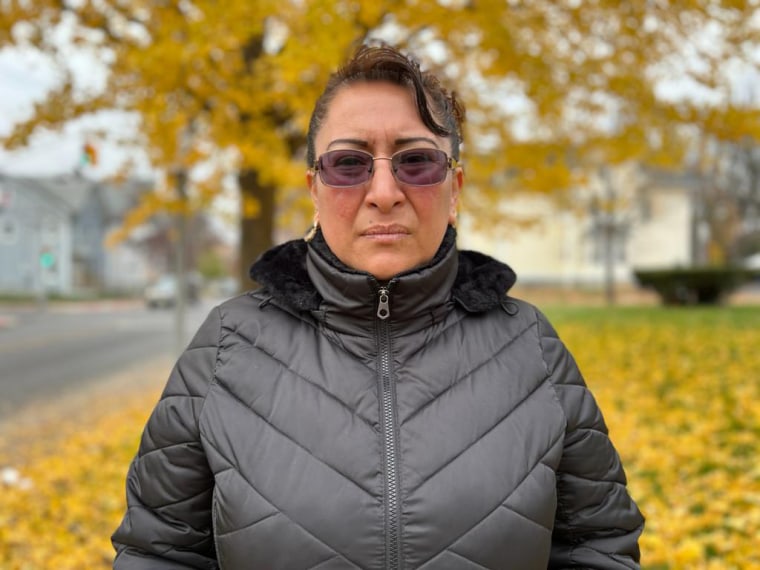VAN HORN, Texas — They are small warnings on Facebook, diluted between thousands of comments and hundreds of photos in online groups looking for missing migrants at the border.
"Sir, remove your phone number from here," one Facebook user advised another. "They will ask for money in exchange for information."
"It is dangerous to put the number," another person said. "In the networks there are scammers who do not feel the pain of the one who suffers."
"Bad people profit from the pain of others," another Facebook user wrote.
Criminal groups have targeted families searching for loved ones who disappeared at the border while migrating to the United States.
After seizing data and photos on their social networks, scammers stalk families on WhatsApp and by phone. They report alleged kidnappings of missing relatives, re-create false proof of life and ask for thousands of dollars for ransoms that will never occur.
Noticias Telemundo Investiga spoke, on camera and off camera, with several victims. They described scams that are fueled by the hope of finding lost migrant relatives, which manage to be credible due to the terrible reality near the border: Migrant kidnappings occur daily in the Mexican part, and disappearances have grown to proportions never seen in the past.
'We have your family member'
Rocío Palate, a 47-year-old immigrant from Ecuador, said her heart skipped when she received the first WhatsApp message.
“We have your relative,” they wrote. She doubted, mistrusted, suspected, but she was also dragged by the strong desire that her brother José Luis Palate was alive, waiting for her help from a distance.
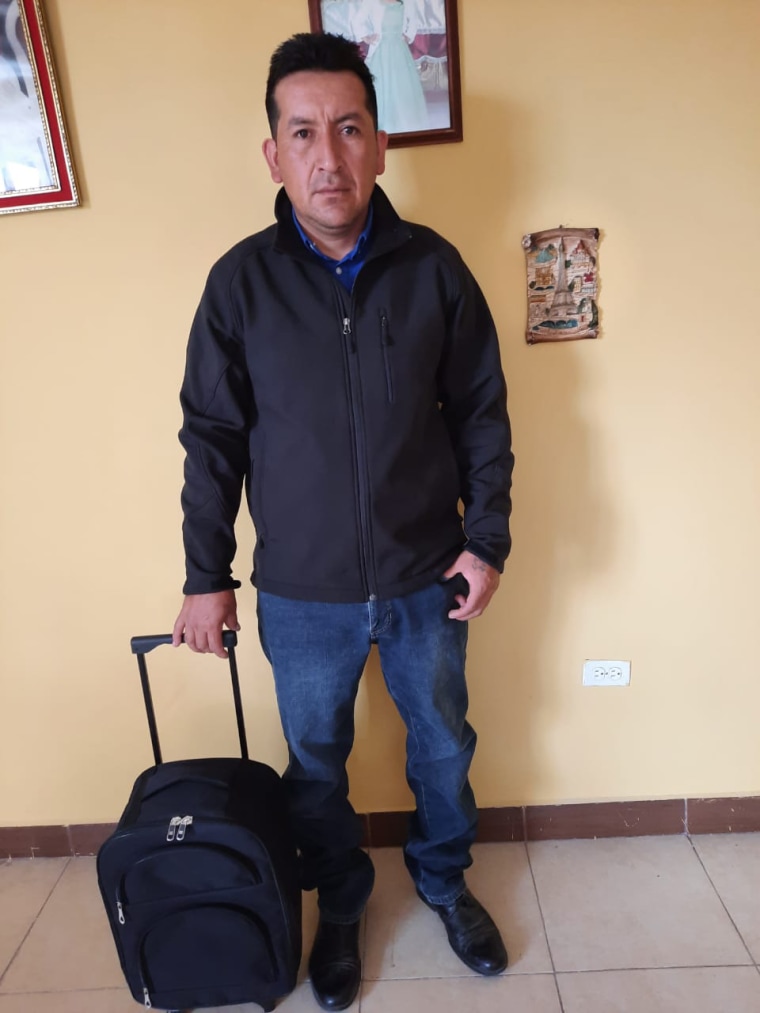
They had not heard from José Luis Palate, a 41-year-old bricklayer, for two months.
Rocío Palate was waiting anxiously for him in New Jersey. Through her cellphone she was helping him every step of the way — from the moment he said goodbye to his children in Ecuador carrying a black briefcase until he told her that he was jumping over a wall near El Paso, Texas, on May 28.
With temperatures approaching 100 degrees Fahrenheit, everything was complicated after the crossing. José Luis Palate sent his sister a photo showing the tips of his shoes and before him, all one could see was desert, just desert. He said he was lost.
They tried to speak, to figure out where he was, but his cellphone battery was low. “I felt his desperate, dying voice,” his sister explained. During the heat peak that day, she called him several times, but he never answered. Rocío Palate thought he was already in Border Patrol custody and that’s why he wouldn’t pick up.
Until he answered at 9:48 p.m.: "'Help me — tell them to come pick me up. I have fallen asleep. Help me,'" Rocío said about her last conversation with her brother. "They are the last words he said to me. The battery was already running out, and he hung up there."
At 1 a.m. the phone rang once more, and then there was no signal. The coyote who was supposed to pick Rocío Palate's brother up did not respond to her calls, either.
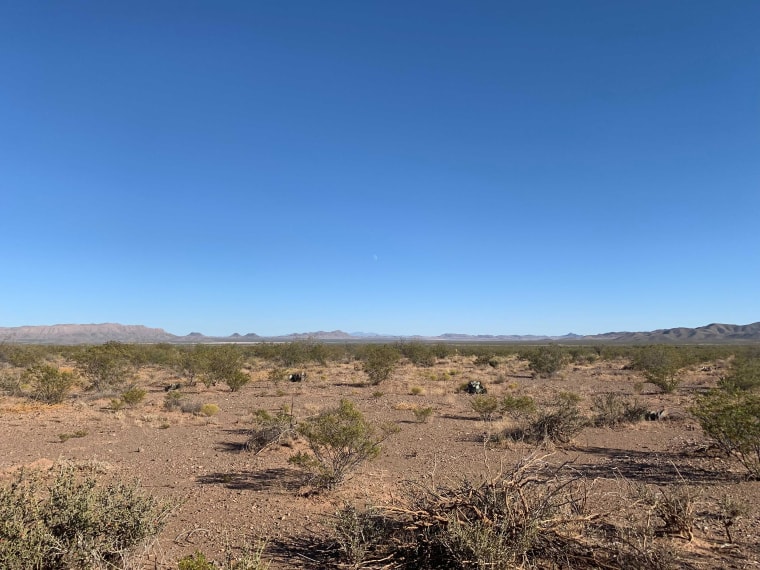
Desperate, Rocío Palate called 911, local authorities, consulates and border rescue groups in the following days. She said the Ecuadorian Embassy told her nothing could be done; they needed 72 hours to pass before reporting the disappearance.
Two months later, devastated by the lack of news from José Luis Palate, the family posted in a Facebook group asking for any news regarding him.
There are several pages on Facebook where desperate messages, hungry for clues, are mixed with some happy announcements of “found alive” that give hope to other families. Each message is accompanied by images, many of them smiling selfies and happy family photos of migrants before their trail was lost on the way north.
Rocío Palate was contacted after the family posted on Facebook about her missing brother.
'I give you your brother'
The phone numbers were from Mexico, and it was a combination of written messages, voice messages and calls. But all the messages disappeared from the chat the second after Rocío Palate saw them. That made her hesitate.
“If you want to have your family member by your side, deposit $5,000 right now and I will give you your brother at a certain location near San Antonio,” Rocío Palate said she was told.
She asked for proof of life. They sent her photos of her brother. One of them showed him holding a sign with the date of that day written on it. Another one showed him appearing sad. There was also a video in which a man was seen lying down, with half his face covered. Everything appeared and disappeared instantly.
The family had time to take screenshots. They hesitated: The photos looked fake, stuck together, and the man in the video could be any man with a sharp nose, like her brother's. She asked to speak to her brother, but she was never able to do so.
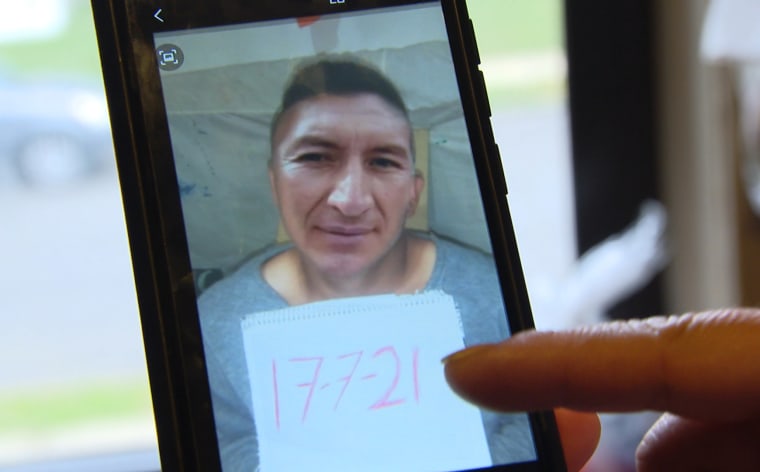
However, the alleged kidnappers called Rocío Palate and mentioned intimate details about her brother, including names of his family members.
"They told me the name of their daughter and their son. I said, 'How do they know the two children?'" Rocío Palate said. She told Noticias Telemundo Investiga that's when she thought they really did have her brother captive.
The supposed kidnappers gave Rocío Palate an ultimatum. If she didn’t pay, they were going to kill her brother. That Sunday night, 10 minutes before the money transfer store closed, Rocío Palate went to make a payment of $5,000.
"I thought they had him, and at that moment I didn’t care about anything. All I wanted was for them to release my brother and give him back to me," she said between tears. "Because his life was worth more than that, and I didn’t care, because you can earn money, but you can't do that with a human life."
Rocío Palate hurriedly followed all instructions: She paid the money in five discrete payments of $1,000, all to different Mexican accounts in the name of different people, all women. And there were two more conditions: She had to tear all the pay stubs into pieces and send them a video while destroying them.
That was it. There would be nothing else. No one confirmed the payment, and there were no more phone conversations. They never heard from José Luis Palate.
Rocío Palate then realized she was scammed.
'Everyone could see his photos'
The questions then arise: Why didn’t Rocío Palate realize her phone number was on Facebook or that they had never specifically said "brother" but just "relative"? There was also the fact that they deleted all the messages and all the photos immediately, and when she asked to speak to her brother, the call always cut off beforehand.
When it came to the photos of her brother they sent as proof of life, Rocío Palate figured it out.
"I realized where they got it from," she said. "They looked for his name, and, as he had Facebook open, everyone could see his photos."
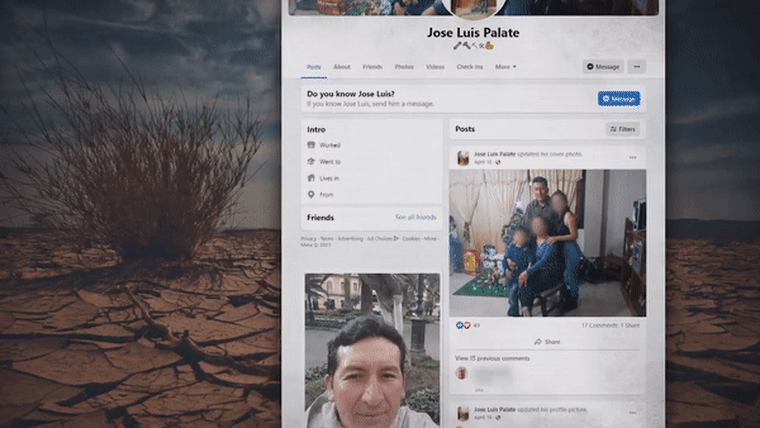
The scammers had cropped José Luis Palate's face from photos on his public Facebook profile and found the children’s names in the photo tags.
Weeks later, new scammers tried her again, but this time she was wiser to their ploys.
The method is repeated
Without official data to know the scale of the scam, the practice seems to affect multiple families who have publicly posted about the disappearance of their loved ones who migrated north.
"From the communications we have been making on Facebook about the disappearance, we have received many, many messages, but they are all edited photos. We even received a call — and they did scam us," said the sister of a missing migrant who did not want to publish her name for fear of reprisals from the scammers.
Her relative crossed the border with a group of migrants led by a coyote, but they left him behind in the bush near Uvalde, Texas, because he was injured and could not keep up with the group. They never heard from him again.
The same scamming methods are repeated. After a post on social media, scammers make contact in private, send dubious photos of the missing migrant as proof of life and ask for thousands of dollars for ransom.
U.S. Immigration and Customs Enforcement, or ICE, has an arm dedicated to investigating human smuggling crimes. It told Noticias Telemundo Investiga that it doesn't have a record of these scams. It has only known actual cases of kidnappings, a spokeswoman in South Texas said by phone.
But some counties on the Texas border do know about these extortions.
In Culberson County, in West Texas, Sheriff Oscar Carrillo said he was overwhelmed by the unprecedented increase of missing and dead migrants in his jurisdiction — a harsh and remote area of extreme temperatures, considered one of the riskiest areas for border crossings.
During a patrol with Noticias Telemundo Investiga, Carrillo received a call from a family who had reported the disappearance of a loved one.
On the other end of the phone, the worried voice of a Mexican woman could be heard: "They are asking us $5,000 to deliver [the relative]. But the photo, the truth, does not convince us. We have already sent it for examination, and it is a photomontage," the woman told the sheriff.
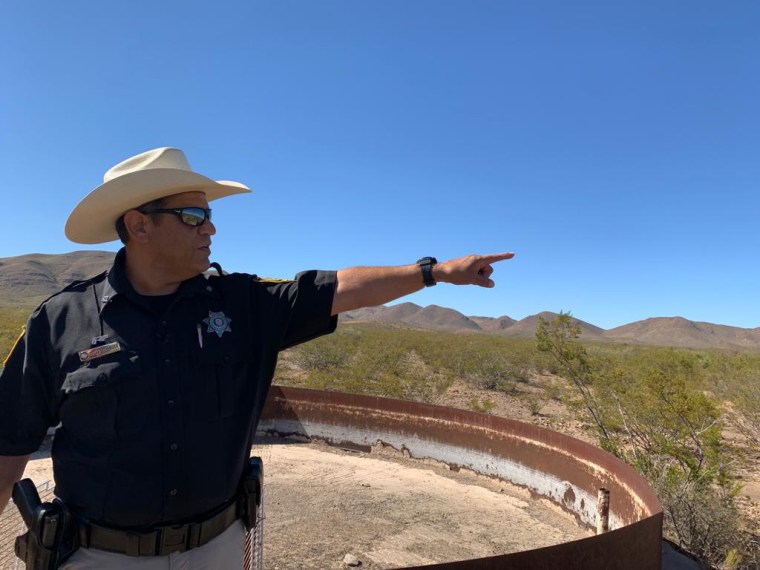
Carrillo was not surprised to hear the account, but he was shocked by such a twisted scam.
“It is possible. It is what the cartels do: They extort money. They take money from the families,” he said after the call during a drive through imposing hills that migrants must first cross before smugglers try to pick them up.
Criminals, Carrillo said, take advantage of the fact that reports of disappearances at the border are at levels never seen before.
Searches and rescues of migrants at the border jumped from 4,920 in fiscal year 2019, before the pandemic, to 12,833 in fiscal year 2021, according to U.S. Customs and Border Protection.
There's also been a jump in deaths: Authorities found 557 bodies in fiscal year 2021, almost double that of 2019, before the pandemic. This has been especially acute in West Texas, where the sheriff is located.
In the El Paso area — where José Luis Palate, Rocío Palate’s brother, was lost — those rescues jumped 5,500 percent, a number that's hard to believe.
Rocío Palate's sleeplessness comes not from having paid $5,000 to scammers, she said. What eats her up the most is that she didn’t think of telling her brother to call 911.
Days after the disappearance, a local police officer told Rocío Palate that her brother should have called 911 when he was lost, instead of relying on his sister in New Jersey, thousands of miles away, to get the traffickers to pick him up.
"I think about my brother all the time," Rocío Palate said. "I think that when he asked me for help, I couldn’t do anything. I think I’m to blame because I couldn’t do anything at that time, because I didn’t know how to do it. I only ask God that he is alive, but sometimes I think the worst. There is no other explanation: Because, if not, where is he?"
An earlier version of this story was originally published in Noticias Telemundo.
Follow NBC Latino on Facebook, Twitter and Instagram.
